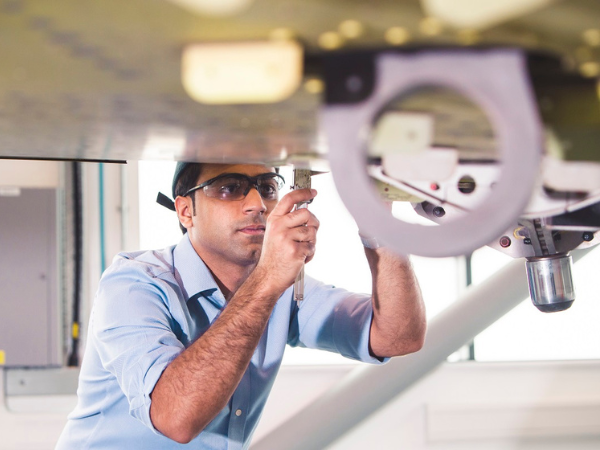Cranfield University's Advanced Lightweight and Composite Structures MSc empowers you to develop safer, next-generation vehicles and aircraft


New Delhi [India], June 11 (ANI/SRV): Cranfield University, one of the leading specialist postgraduate universities in technology in the United Kingdom, offers its Advanced Lightweight and Composite Structures MSc course to address the industry challenges in the aerospace, automotive, motorsport, marine and renewable energy industries. The one-year, full-time programme aims to deliver strong experimental, numerical, and analytical skills in structural mechanics for both composite and metallic components.
The course is accredited by the Royal Aeronautical Society (RAeS) and the Institute of Mechanical Engineers on behalf of the Engineering Council as meeting the requirements for further learning for registration as a Chartered Engineer (CEng). Candidates applying for the course must hold a CEng accredited BEng/BSc (Hons) undergraduate first degree to show that they have satisfied the educational base for CEng registration.
Addressing the strong demand from industry for specialists with a sound understanding of advanced lightweight metallic and composite materials, material technologies and numerical simulation; the Advanced Lightweight and Composite Structures MSc was introduced in 2003. Companies that have recruited graduates of this course include Airbus, Rolls-Royce, Safran, Jaguar Land Rover, and Aston Martin.
The Advanced Lightweight and Composite Structures MSc is advised by an Industrial Advisory Panel comprising senior technical specialists from aerospace, automotive, and associated sectors. It includes representatives from Airbus, Jaguar Land Rover, and the Cranfield Impact Centre. This maintains course relevancy and ensures that graduates are equipped with the skills and knowledge required by major employers.
To offer a holistic learning experience, students of the course undergo a series of structured lecture programmes, tutorials, case studies, hands-on computing, individual projects, and guest lectures. The course delivery involves 40 per cent weightage given to taught modules (students have to complete eight compulsory modules); 20 per cent weightage given to group projects and the remaining 40 per cent for an individual research project. Some of the modules for the course include Advanced Composite Analysis and Impact; Introduction to Continuum Mechanics; Thin-walled Structures; Advanced Simulation for Impact, among others.
Through the course, graduates can learn to solve the industrial challenges for weight saving; understand how advanced lightweight metallic and composite materials and structures perform under static and dynamic loading, including crashes and bird strikes. They gather knowledge and skills in design and analysis that help them navigate the issues of sustainability and carbon reduction in structural designs for automotive, aircraft and wind turbines without compromising structural reliability and safety.
Further, the students of the Advanced Lightweight and Composite Structures MSc course also receive the opportunity to participate in group or individual projects sponsored by the industry. This helps them to apply their learning in practice, gather hands-on experience in problem-solving and strengthen their future career opportunities.
The Advanced Lightweight and Composite Structures MSc course is suitable for graduates with engineering, science, applied science or related degrees, who are keen to pursue roles including design engineer, stress engineer, research and development engineer, numerical code developer, consultant, and academic researcher. This course provides graduates with the necessary skills to pursue a successful career in the automotive, aerospace, maritime and defence sectors.
To apply for the course, interested candidates must possess a first- or second-class UK honours degree or equivalent in mathematics, physics, computing, or an engineering discipline. Candidates with a degree in a less applicable discipline, or mature applicants with alternative qualifications, may be accepted subject to the discretion of the course director.
As per the latest QS World University Rankings by Subject, Cranfield University's 'Engineering - Mechanical, Aeronautical and Manufacturing' has been ranked 27th in the world, climbing 18 places from last year's ranking and attaining top scores in Employer and Academic Reputation.
In addition, Cranfield University has been honoured with the Queen's Anniversary Prize six times; a national honour given to educational institutions for work conducted in the public interest.

Cranfield University brings world-class expertise, large-scale facilities, and unrivalled industry partnerships toward creating leaders in the technology domain. The University also has one of the best teacher-student ratios for any university in the UK, with one member of academic staff to every five students. Furthermore, the strong global alumni base of the University brings a host of benefits to the students and outgoing professionals while helping them apply their expert knowledge and skills in the global economy.
To know more about the course, visit: https://www.cranfield.ac.uk/courses/taught/advanced-lightweight-and-composite-structures
This story is provided by SRV. ANI will not be responsible in any way for the content of this article. (ANI/SRV)
Source: BUSINESS
